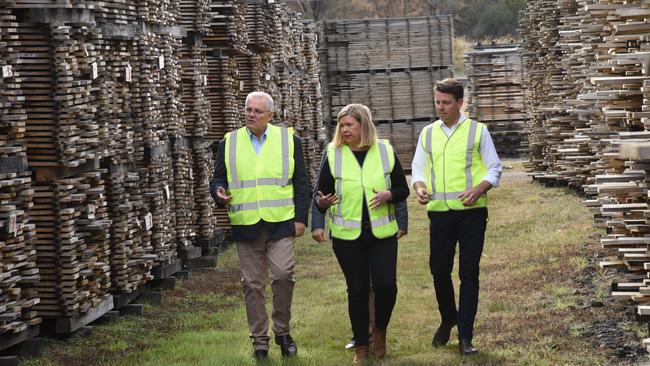Suburban working class, rural towns of fickle Bass keep leaders guessing
More fickle than the northern Tasmanian weather, the electorate of Bass has changed hands a dizzying eight times since 1990 and may be critical to who takes the Lodge on May 21.

More fickle than the northern Tasmanian weather, the electorate of Bass has changed hands a dizzying eight times since 1990 and may be critical to who takes the Lodge on May 21.
Taking in Launceston and much of the island state’s northeast, the Coalition’s most marginal seat, Bass has receiving a lot of leaders’ love this campaign.
Scott Morrison has dropped in for three days’ campaigning – April 14, 29 and 30 – and Labor leader Anthony Albanese for two, April 11 and 12. Held by Liberal moderate Bridget Archer by a wafer-thin 0.4 per cent, its voters appear almost evenly divided politically. Strong Labor working-class suburbs in Launceston are matched by conservative rural towns and agricultural areas, the domain of old landed gentry and Liberal-leaning farmers.
While more blue than red over time, it was last held for more than one term by Labor (2007-13), although even then the ALP changed candidates in 2010.
It was last held by the same party for more than two terms by the Liberals’ Warwick Smith, from 1984 to 1993. Since then, this diverse electorate has swung like a windsock in the Roaring 40s.

This political deadlock makes the outcome on polling day vulnerable to the influence of factors such as the popularity of an individual candidate, preference flows and events during the campaign.
The intimate nature of the community means social, family or business connections also play a significant role.
Tasmania’s Hare-Clark multi-member electorate voting system – in which how to vote cards are banned – means locals are less likely to follow such guidance at federal elections, making preference flows harder to predict and control. Ms Archer, a sheep and cattle farmer and former George Town mayor, appears to be a reasonably popular local MP, with praise even from the Labor side, privately at least.
She is not fazed by the tight margin. “You do your job in the times between elections – an election campaign to me, particularly in a marginal seat, should start from when you’re elected,” Ms Archer told The Australian.
“I’m not doing anything different during the campaign to what I have all the way through. Getting out and talking to people and listening to people has been a feature of how I’ve undertaken my role.”
Having clashed with her own party to represent what she argues are the views of her electorate – on an integrity commission, religious discrimination and cashless welfare cards – she has tapped into Tasmania’s love of a rebel.
Labor comeback candidate Ross Hart, whom Ms Archer deposed as sitting MP in 2019, repeatedly has declined to be interviewed by The Australian but appears to be focusing on issues affecting Labor’s core constituency in battling suburbs.
“The good thing is people know me up here – I’m a local,” Mr Hart, a Launceston lawyer, told supporters in a recent email.
“I’ve worked in this community for decades. People also remember that I took a strong stand against Scott Morrison’s cashless welfare card. That policy was wrong then, and it’s wrong now. I’ll never support it.”
To outside observers, regional and provincial Tasmania often prioritises different issues to those being discussed and debated on the mainland or even in Hobart.
While healthcare and cost-of-living pressures are lead issues across the state, topics across farming, manufacturing and energy policy – promise of “green” hydrogen; the Marinus Link – cannot be ignored in the north.
Polling commissioned by News Corp, publisher of The Weekend Australian, early in the campaign had Ms Archer ahead on a two-party-preferred basis by 57 per cent to 43 per cent.




To join the conversation, please log in. Don't have an account? Register
Join the conversation, you are commenting as Logout